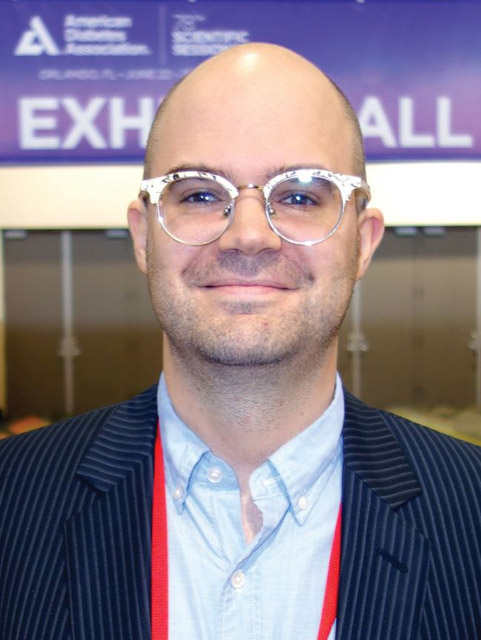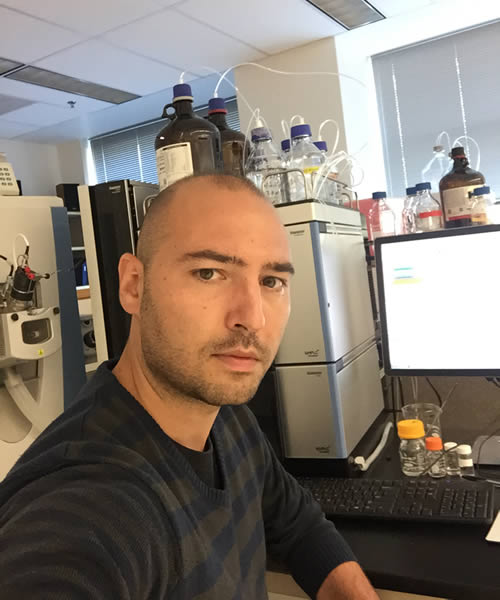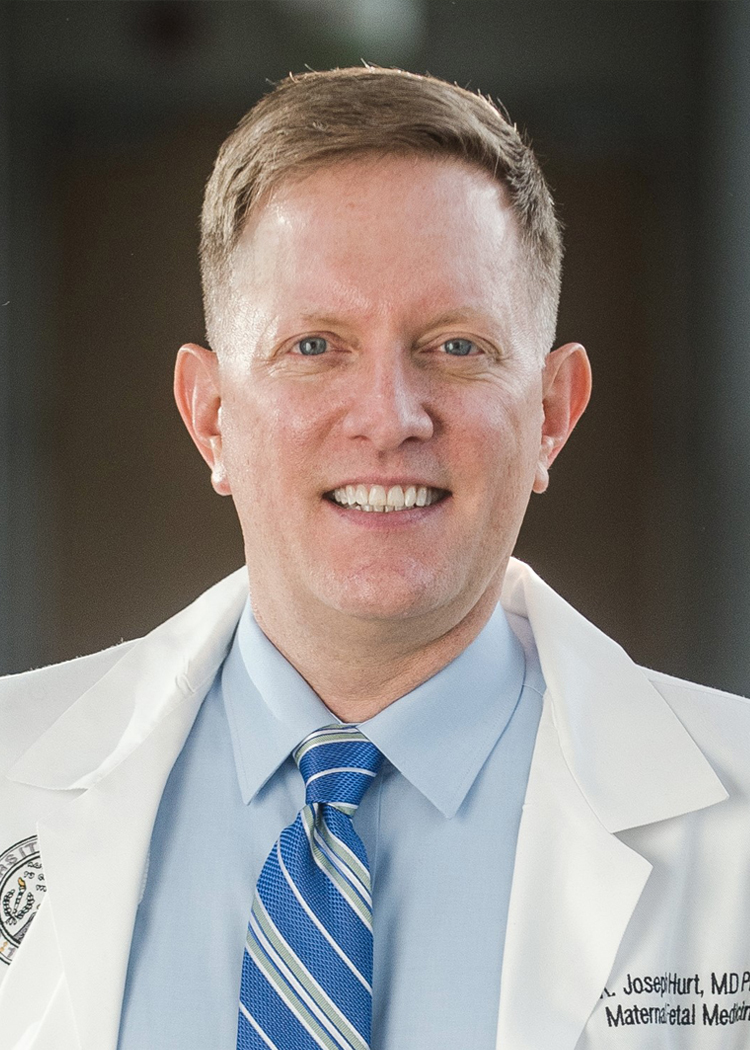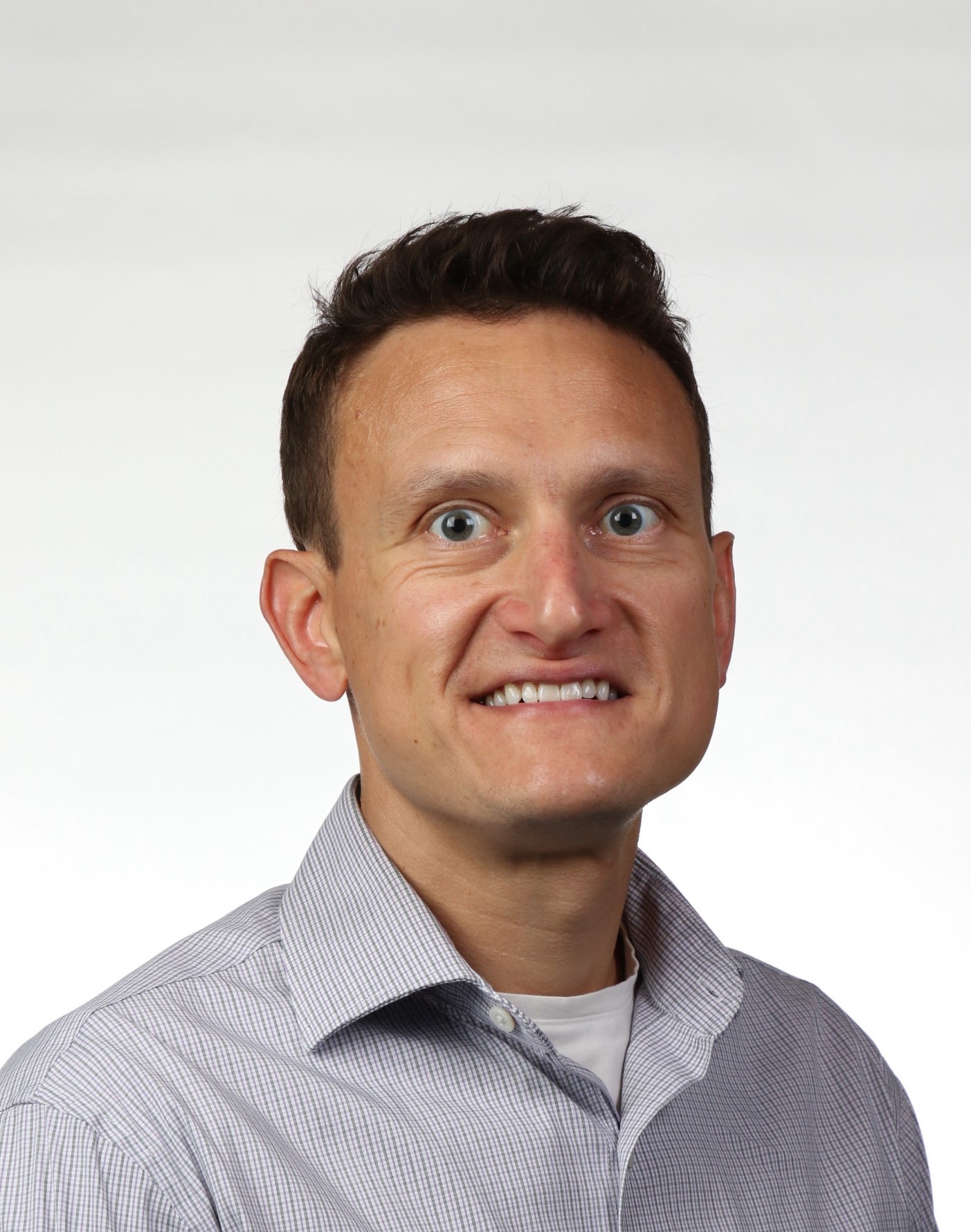FACULTY
FACULTY
FACULTY
FACULTY
FACULTY
Integrated Physiology faculty are associated with multiple departments, representing diverse research interests and scientific approaches, but sharing common interests in understanding how complex physiological systems are regulated. In addition, the faculty all share a deep commitment to quality graduate education and are actively engaged in mentoring and supporting students as they progress toward their PhD.
Faculty research fall into one of more of the research tracks below:
Major Research Tracks
Reproductive Biology
Reproductive Biology was founded in 2004 as an interdepartmental Graduate Program. The basic science and clinical faculty are drawn from 10 different Departments and Divisions, allowing students to take an integrated, translational, multidisciplinary approach to the study of reproductive biology and pathophysiology. Students in the Reproductive Biology Track have opportunities to investigate research areas including:
- Signal transduction and transcriptional regulation
- Reproductive Endocrinology and Metabolism
- Neuroendocrinology
- Breast, Ovarian and Uterine cancers
- Immunology
- Epidemiology
- Complications of Pregnancy
- Development and function of the reproductive system
- Mammary gland development and lactation
- Placental development and function
- Obesity and fetal developmental programming
Cellular Physiology
Training in Cellular Physiology prepares graduate PhD students for independent careers in biomedical research through grounding in the fundamental principles of physiology and biophysics, and their application to important problems of cellular systems regulation. Students in the Cellular Physiology track have a broad array of research projects from which to choose, and access to an equally broad assortment of cutting edge techniques and instrumentation for their projects, including advanced electrophysiology, high-resolution imaging, and novel biochemical (including photochemical) tools.
Research projects in Cellular Physiology cover problems such as recycling of synaptic vesicles, transduction and modulation of signals in the olfactory bulb, mechanisms of sound localization in mammals, the role of glia and spontaneous secretion of transmitter in the brain, characterization of sodium channel isoforms in excitable cells, regulation of potassium channel expression during development, excitation-contraction coupling, molecular physiology of cardiac pacemaking, processing of sound information in the auditory brainstem, neurophysiology of making decision and initiating actions, and neurophysiology of the cerebellum.
Molecular Nutrition and Metabolic Systems
Research in molecular nutrition and metabolic systems underpins advances in many areas of medicine and physiology, and is essential for understanding complex diseases and disorders of human biology, such as obesity, diabetes and cardiovascular disease. Students in the Molecular Nutrition and Metabolic Systems (MNMS) track have opportunities to investigate how nutrients are metabolized by cells, organs and higher systems, and how defects in metabolic systems contribute to human disease.
Research projects in the MNMS track employ state of the art techniques in metabolism, cell and molecular biology, imaging, genomics and proteomics that provide students with capabilities of generating sophisticated mechanistic insight into metabolic disorders and disease processes. Students that successfully complete MNMS training and research programs are prepared for independent careers in biomedical research in academic, industry and government laboratories.
Cardiovascular/Pulmonary/Renal/GI Physiology
Cardiovascular/Pulmonary/Renal/GI Physiology research seeks to uncover mechanisms, and integrating principals, regulating fundamental cardiac, pulmonary, renal, and GI systems. Investigators in this track pursue mechanistic research related to how hormones, metabolism, ion channel properties, exercise, and diseases, regulate, or disrupt, multiple physiological systems.
Research projects in this track focus on serious human health problems related to cardiac function, pulmonary disorders, renal abnormalities, endothelial biology, obesity, and diabetes. These projects employs cutting-edge molecular biology, imaging, genomics, ion channel and modeling approaches in cellular, organ, and higher-order experimental systems. Students in this track will have opportunities to integrate many of these experimental approaches in the pursuit of understanding cardiac, pulmonary, renal, and GI systems biology.
Search
Filter results by:
Matthew Babcock PhD
Assistant Professor
Research Focus:
Accepting Students
Cardiovascular/Pulmonary/Renal/GI Physiology
My research is focused on how sex hormones influence blood pressure status and cardiovascular disease risk.
Email:[email protected]
Emily Bates PhD
(She/Her/Hers)
Associate Professor
Completed Mentor Training Course
Research Focus:
Accepting Students
Developmental Biology
Developmental Neuroscience
Disease and Developmental Disorders
Fly Research Group
Genomics Bioinformatics
Glia
Neuropharmacology
We study how ion channel activity (bioelectricity) contributes to morphological development in multiple tissues (craniofacial structures, fly wings, brain, pancreas, and bone).
Email:[email protected]
Caitlin Bell MD
Assistant Professor
Research Focus:
Accepting Students
Bioinformatics
Cancer Biology
Cardiology
Cardio-oncology
Cardiovascular & Pulmonary Biology
Cardiovascular Diseases
Cardiovascular/Pulmonary/Renal/GI Physiology
Cell Biology
Disease modeling
Despite significant advances, cardiovascular disease (CVD) and cancer are still the leading causes of death globally and are increasingly co-prevalent in aging patients. Mounting epidemiologic evidence demonstrates that patients with cancer have substantially increased morbidity and mortality from CVD, and those with CVD also have a concurrent increased risk of cancer. The Bell lab focuses on understanding the bidirectional interactions and mechanistic similarities between cardiovascular disease and cancer. We investigate this relationship using multiple techniques and levels of data including inducible lineage-tracing murine models, single cell RNA and ATAC sequencing, cell culture assays, and human genetics, with all of our hypotheses being further generated and refined by experience in the Anschutz Cancer Center's Cardio-Oncology Clinic. Discovery of these mechanisms and interactions allows for improved disease screening and stratification of high-risk patient populations, the development of new therapies for cancer-mediated CVD, and improved cardiac care for cancer patients and survivors.
Email:[email protected]
Richard Benninger PhD
Associate Professor
Completed Inclusive Teaching Trainings
Research Focus:
Cell Biology
Cellular Physiology
Molecular Nutrition & Metabolic Systems
The Benninger lab is a multi-disciplinary team of scientists who are guided by engineering principles and technologies to study the endocrine pancreas (islets of Langerhans). With mechanistic knowledge underlying the dynamics of islet function and hormone release, we can develop diagnostics and therapeutic interventions to effectively manage, cure and prevent diabetes. Towards this goal the lab combines novel optical imaging and ultrasound imaging approaches to study the function of the islets of Langerhans over multiple levels of organization, and how function is disrupted in diabetes.
Email:[email protected]
Bryan Bergman PhD
Professor
Research Focus:
Molecular Nutrition & Metabolic Systems
Intermuscular adipose tissue, myosteatosis, lipidomics, triglyceride, insulin sensitivity, insulin resistance.
Email:[email protected]
Petter Bjornstad MD
Associate Professor
Research Focus:
Cardiovascular/Pulmonary/Renal/GI Physiology
Molecular Nutrition & Metabolic Systems
Integrative endocrinology and nephrology research team focused on answering questions and addressing complications surrounding kidney disease and cardiovascular disease in youth and adults with diabetes.
Email:[email protected]
Andrea Bonetto PhD
(he/him/his)
Associate Professor
Completed Upstander/Bystander Training
Research Focus:
Aging
Cancer Biology
Molecular Nutrition & Metabolic Systems
The Bonetto Lab investigates the molecular mechanisms responsible for abnormal muscle, bone and liver crosstalks in cachexia due to cancer and/or anticancer treatments. In order to achieve our goals, we leverage different in vitro and in vivo models, paired with a set of comprehensive molecular, metabolic, and pharmacologic tools to dissect the causes of musculoskeletal abnormalities associated with cancer.
Email:[email protected]
Kristen Boyle PhD
(She/Hers)
Associate Professor
Completed Mentor Training Course, Upstander/Bystander Training
Research Focus:
Development
Developmental Biology
Gene Regulation
Molecular Nutrition & Metabolic Systems
Stem Cells
Our research focuses on understanding how infants exposed to stressors in utero, such as obesity, diabetes, or biological stress, can predispose that child to obesity or metabolic disease using mesenchymal stem cells from infant umbilical cord tissue.
Email:[email protected]
Andrew Bradford PhD
Professor
Research Focus:
Molecular Nutrition & Metabolic Systems
Reproductive Biology
My research interests focus on hormone/growth factor signaling and cancer. Specifically, our laboratory is studying the role of selective protein kinase C (PKC) isoforms in the modulation of cell growth and death in endometrial cancer.
Email:[email protected]
Victoria Catenacci MD
Associate Professor
Research Focus:
Molecular Nutrition & Metabolic Systems
Dr Catenacci’s primary research interest is in the role of physical activity in long-term weight loss maintenance.
Email:[email protected]
Zachary Clayton PhD
Assistant Professor
Research Focus:
Accepting Students
Aging
Animal models
Cancer Biology
Cardio-oncology
Cardiovascular Diseases
Cellular Physiology
Exercise Science
Mouse Models
Nutrition
Physiology
Our laboratory seeks to: 1) understand the mechanisms by which cancer and chemotherapy treatment influence cardiovascular health, and 2) determine safe and effective therapeutic strategies that can be implemented to prevent and/or treat cardiovascular dysfunction following cancer treatment. To accomplish this, we employ translational research approaches spanning from cell culture, to mouse models, to human clinical studies.
Email:[email protected]
Sean Colgan PhD
Professor
Research Focus:
Cardiovascular/Pulmonary/Renal/GI Physiology
Cellular Structure
The Colgan Lab studies mucosal inflammation with focus on intestinal inflammation in the context of inflammatory bowel disease and other GI diseases. Studies are aimed at understanding how epithelial and endothelial cells coordinate barrier function and inflammatory responses at mucosal surfaces. Our lab takes a multifaceted approach by investigating the relationships between gut microbiota, host immune system, genetic background, and environmental influences as it pertains to mucosal health and disease, with research emphasis on energy metabolism, host-microbe interactions, hypoxia-inducible factor, and innate immunity.
Email:[email protected]
Melanie Cree-Green MD, PhD
Associate Professor
Research Focus:
Accepting Students
Molecular Nutrition & Metabolic Systems
My research interests are focused on how insulin works in youth with polycystic ovarian syndrome or diabetes. We are trying to better understand how high insulin levels cause disease, so that we can prevent related conditions such as fatty liver disease or heart disease and develop new therapies.
Email:[email protected]
Angelo D'Alessandro PhD
Professor
Research Focus:
Accepting Students
Molecular Nutrition & Metabolic Systems
Omics technologies, especially metabolomics and proteomics, have helped us revealing emerging patterns in systemic responses to acute or chronic hypoxia. By focusing on cancer metabolism and (red) blood cell biology, we are increasingly appreciating shared molecular mechanisms driving systemic responses to trauma/ hemorrhagic shock, I/R injury, sickle cell disease, ageing and inflammation, mammalian hibernation and pulmonary hypertension.
Email:[email protected]
Christopher Evans PhD
Professor
Research Focus:
Accepting Students
Allergy
Asthma
Cardiovascular & Pulmonary Biology
Gene Regulation
Research in the Evans lab focuses on how airway mucins regulate respiratory health and disease. Two secreted mucins--MUC5AC and MUC5B--are the predominant macromolecular components of airway mucus. MUC5AC and MUC5B regulate host mucosal defense in health, but their excessive or aberrant expression is associated with transient infections and with a wide range of lung diseases such as asthma, cystic fibrosis, chronic obstructive pulmonary disease, pulmonary fibrosis, and lung cancer.
Email:[email protected]
Gidon Felsen PhD
(He/Him)
Professor
Completed Mentor Training Course
Research Focus:
Accepting Students
Cellular Physiology
Cognitive Neuroscience
Computational Neuroscience
Disease and Developmental Disorders
Molecular Nutrition & Metabolic Systems
Neuroengineering
Optogenetics
Systems Neuroscience
The Felsen lab studies the neural circuit basis of behavior and decision making. We use electrophysiological, behavioral, pharmacological, molecular, and computational methods to examine how sensory input is transformed into plans for motor output, and how movements in turn affect sensory perception and representations. We are interested in how these processes occur in the normal brain, as well as how they are affected by pathological conditions.
Email:[email protected]
Anastacia (Tasha) Garcia PhD
Assistant Professor
Completed Implicit Bias Training, Completed Mentor Training Program
Research Focus:
Accepting Students
Cardiovascular/Pulmonary/Renal/GI Physiology
The overall focus of the Garcia Lab is to better understand the unique adaptations governing pathological cardiac remodeling, exercise intolerance, and the progression to heart failure in pediatric patients with complex congenital heart disease, including hypoplastic left heart syndrome and other single ventricle defects. The ultimate goal of this research is to develop the critical knowledge base and infrastructure necessary to identify efficacious therapies for improving outcomes in this vulnerable group. The lab utilizes several unique tools to address the mechanisms of cardiac dysfunction including whole animal and cell culture-based models, as well as access to a meticulously preserved Pediatric Tissue and Blood Bank here at the University of Colorado Anschutz Medical Campus.
Email:[email protected]
Emily Gibson PhD
Associate Professor
Research Focus:
Cellular Physiology
Neuroengineering
Optogenetics
Professor Gibson's lab conducts multidisciplinary research at the intersection of photonics and neuroscience. Our lab develops novel optical devices using multiphoton, superresolution and structured illumination microscopy applied to living systems with the goal of aiding basic neuroscience research and development of clinical tools.
Email:[email protected]
Curtis Henry PhD
(He/Him)
Associate Professor
Research Focus:
Adaptive Immunity
Basic Sciences - Immunology
Cancer Biology
Cellular Structure
Immunotherapy
Innate Immunity
Stem Cells
Research conducted in the Henry laboratory focuses on understanding how cancer-associated comorbidities promote cancer with the goal of improving the efficacy of chemo- and immune-based therapies in patients falling within high-risk demographics.
Email:[email protected]
Katharina Hopp PhD
Assistant Professor
Research Focus:
Accepting Students
Cardiovascular/Pulmonary/Renal/GI Physiology
The Hopp lab studies the functional role of immune cells on PKD progression. Specifically, the lab researches the role of T cells in PKD, their interplay with other immune cells and the cystic epithelium, and their impact on cyst initiation and progression. She believes that these studies will provide novel insights into the pathomechanisms of disease/disease heterogeneity, and give rise to new therapeutic approaches.
Email:[email protected]
K.Joseph Hurt MD, PhD
Associate Professor
Research Focus:
Accepting Students
Reproductive Biology
The goal of the Preterm Labor Research Laboratory (Hurt Lab) is to understand reproductive physiology and apply those findings to improve the health of women and infants.
Email:[email protected]
David Irwin PhD
Professor
Research Focus:
Accepting Students
Cardiovascular/Pulmonary/Renal/GI Physiology
My research focuses on discovery of the physiological adaptations to hypoxia and to identify the mechanism(s) by which hemoglobin or other oxygen carrying proteins induce either a positive or negative effect on the pulmonary or systemic vasculatures. Understanding the hemoglobin protein, oxygen delivery, nitric oxide biology, oxidative stress and inflammatory signaling pathways on endothelial cells is critical to this area of work.
Email:[email protected]
Joshua Johnson PhD
Assistant Professor
Research Focus:
Reproductive Biology
Our overall goal is to improve the health and well-being of women. We are investigating mechanisms that control the rate of loss of the primordial reserve of follicles because this rate determines whether a woman will experience a ‘normal’ duration of ovarian function, or instead, will face the early loss of ovarian function as seen in primary ovarian insufficiency (POI), where ovarian function ceases before the age of 40.
Email:[email protected]
Colleen Julian PhD
Associate Professor
Research Focus:
Cellular Physiology
Molecular Nutrition & Metabolic Systems
Dr. Julian's research focuses primarily on the mechanisms underlying human adaptation to the chronic hypoxia of high altitude and, in particular, how these processes influence maternal vascular adaptation to pregnancy, pregnancy outcome and the long-term health of of affected offspring.
Email:[email protected]
Dwight Klemm PhD
Professor
Research Focus:
Cardiovascular/Pulmonary/Renal/GI Physiology
Molecular Nutrition & Metabolic Systems
Adipocyte biology.
Email:[email protected]
Achim Klug PhD
(He/Him)
Professor
Completed Mentor Training Course, Completed Upstander/Bystander Training
Research Focus:
Accepting Students
Cellular Physiology
Disease and Developmental Disorders
Glia
Ion Channels & Biophysics
Optogenetics
Sensory Systems
Synaptic Physiology
Synaptic Signaling and Plasticity
Systems Neuroscience
Our laboratory studies the mammalian sound localization pathway in both rodent animal models and human subjects. This circuit is involved in telling us “where” in space a sound is coming from, but it is also important to help us spatially separate multiple simultaneous and competing sounds from each other, and thus help us function in typical “cocktail party” situations. We would like to understand how this circuit operates in the healthy auditory system, and how it changes in medical conditions such as central hearing loss or autism spectrum disorder (ASD). Recently we have been able to reverse one form of age-related hearing loss in rodents and are now in the process to translate these results to human subjects in a clinical trial.
Email:[email protected]
T. Rajendra Kumar PhD
Professor
Completed Mentor Training Course
Research Focus:
Accepting Students
Neuroendocrinology
Reproductive Biology
The Kumar Laboratory investigates all aspects of gonadotropin biology, including gonadotrope development and tumorigenesis, mechanisms of pituitary gonadotropin subunit gene expression and post-transcriptional regulation, gonadotropin biosynthesis with a focus on age-dependent glycosylation, gonadotropin secretion and action with one focus on somatic cell development and regulation in the gonads and the other on osteoclasts in the bone.
Email:[email protected]
Miguel Lanaspa Garcia PhD
Associate Professor
Research Focus:
Cardiovascular/Pulmonary/Renal/GI Physiology
Endocrinology/Metabolism/Diabetes
Email:[email protected]
Edward Lau PhD
Assistant Professor
Completed Mentor Training Course; Completed Upstander/Bystander Training
Research Focus:
Accepting Students
Cardiovascular & Pulmonary Biology
Cell Biology
Cellular Physiology
Computational Biology and Personalized Medicine
Genomics Bioinformatics
Structural Biology
Our lab has a broad range of research interests, encompassing several areas of biochemistry and cell biology:
(1) Protein turnover: development and application of stable isotope labeling mass spectrometry methods to measure protein half-life.
(2) Spatial proteomics: subcellular distributions of proteins, interaction between spatial and temporal protein dynamics.
(3) Cellular physiology: cellular crosstalk by secretome proteins, signatures of cellular senescence, cardiotoxicity and proteostatic disruptions in induced pluripotent stem cell models.
(4) Bioinformatics: correlation and discrepancies of transcript and protein levels, protein prediction with machine learning.
Email:[email protected]
Kristina Legget PhD
(She/Her/Hers)
Associate Professor
Completed Mentor Training Course, Completed Implicit Bias Training
Research Focus:
Cognitive Neuroscience
Developmental Neuroscience
Disease and Developmental Disorders
My research utilizes neuroimaging approaches to understand neuronal circuits and mechanisms that contribute to human obesity. A goal of this work is to understand how different weight loss techniques, such as diet and exercise, affect obesity neurobiology, and how sex and gonadal hormones may influence these effects. I am also interested in the potential for exercise and diet interventions to affect the underlying neurobiology of psychiatric disorders, including schizophrenia and autism spectrum disorders.
Email:[email protected]
Ramon Lorca
Assistant Professor
Research Focus:
Ion Channels & Biophysics
Reproductive Biology
Signal Transduction
In the Lorca lab, we aim to understand the vascular mechanisms underlying the development of pregnancy complications such as fetal growth restriction (FGR) and preeclampsia. In particular, the role of ion channels and intracellular signaling in vascular adaptations to pregnancy. Our lab follows two lines of investigation: 1) to determine the role of K+ channels in the vasodilation of uteroplacental arteries in healthy and complicated human pregnancies, and 2) to develop a novel and physiologically relevant murine model of FGR by reducing maternal uterine circulation using optogenetics and chemogenetics.
Email:[email protected]
Paul Maclean PhD
Professor
Research Focus:
Accepting Students
Cardiovascular/Pulmonary/Renal/GI Physiology
Molecular Nutrition & Metabolic Systems
Dr. Paul MacLean Ph.D. is a tenured Professor at the University of Colorado School of Medicine with 25 years of experience studying obesity and its metabolic complications. He has specific interests in the biological drivers of weight regain after weight loss, exercise as a strategy for weight loss maintenance, and understanding how obesity affects key aspects of women’s health. Dr. MacLean's research in women’s health has included studies of mammary gland development and its function during lactation, perinatal metabolic programming, the menopausal transition, and the risk for breast cancer.
Email:[email protected]
Susan Majka PhD
Professor
Research Focus:
Accepting Students
Cardiovascular/Pulmonary/Renal/GI Physiology
Cell Biology
Stem Cells
The focus of the work in the Majka laboratory is to understand how the normal and reparative function of resident lung mesenchymal progenitor cells (MPC) is altered during the development and course of lung diseases (including pulmonary hypertension, fibrosis, emphysema and TSC/LAM).
Email:[email protected]
Jennifer McKey PhD
(she/hers)
Assistant Professor
Completed Mentor Training Course, Completed Upstander/Bystander Training
Research Focus:
Cell Biology
Development
Developmental Biology
Reproductive Biology
Our team studies perinatal determinants of female fertility with a special focus on the relationship between establishment of architecture and functional differentiation of the mammalian ovary.
Email:[email protected]
Makoto Miyazaki PhD
Professor
Research Focus:
Cardiovascular/Pulmonary/Renal/GI Physiology
Research in the laboratory focuses on the study of molecular mechanism underlying vascular calcification. Vascular calcification is recognized as an independent predictor of cardiovascular morbidity and mortality, particularly in subjects with chronic kidney disease (CKD).
Email:[email protected]
Jenifer Monks PhD
Assistant Professor
Research Focus:
Accepting Students
Cell Biology
Cellular Physiology
Developmental Biology
Reproductive Biology
Structural Biology
In the Monks lab, we explore the basic cellular, molecular, and physiological mechanisms controlling milk secretion. We hope to fill conceptual and experimental gaps that pose barriers to lactation success in humans and improve the health of future generations.
Email:[email protected]
Kerrie Moreau PhD
Professor
Research Focus:
Cardiovascular/Pulmonary/Renal/GI Physiology
Her laboratory focuses on the mechanisms underlying vascular protection of sex hormones including how changes in sex hormones during the menopausal transition in women, and low testosterone in aging men, contributes to an acceleration in aging of the heart, arteries and the brain. Because of the variability observed in the aging process, more recently her laboratory has developed an interest in investigating the effects of “life stressors” that are associated with increased risk for cardiovascular diseases and Alzheimer disease and its related dementias later in life on the trajectory of cardiovascular aging, including history of complicated pregnancies, trauma and post-traumatic stress disorder (PTSD).
Email:[email protected]
Kristen Nadeau MD, MS
Professor
Research Focus:
Accepting Students
Cardiovascular/Pulmonary/Renal/GI Physiology
Molecular Nutrition & Metabolic Systems
Dr. Nadeau’s current research involves trying to understand the reasons for cardiovascular disease in people with diabetes, in particular women. Dr. Nadeau is working to understand how insulin resistance in youth with type 2 and type 1 diabetes relates to the current and future complications of diabetes, such as heart disease, blood vessel disease, as well as exercise and muscle dysfunction and fatty liver disease. Since obesity and type 2 diabetes are increasing in youth, such abnormalities may become increasingly common at increasingly younger ages, and reduce overall lifespan. One of Dr. Nadeau’s research goals is to find treatments for girls with obesity and diabetes that help prevent or treat cardiovascular disease and help them to be better able to exercise.
Email:[email protected]
Kristen Nowak PhD, MPH
Associate Professor
Completed Mentor Training Course; Completed Unconscious Bias Training; Completed Implicit Bias Training
Research Focus:
Accepting Students
Cardiovascular/Pulmonary/Renal/GI Physiology
I perform clinical and translational research focusing on lifestyle interventions, including dietary, to reduce risk of cardiovascular disease and kidney disease progression in patients with kidney diseases including autosomal dominant polycystic kidney disease (ADPKD) and chronic kidney disease (CKD). I also conduct research on the mechanisms of vascular dysfunction in kidney diseases, as well as on novel therapeutics to alleviate such dysfunction.
Email:[email protected]
Eva Nozik MD
Professor
Research Focus:
Cardiovascular/Pulmonary/Renal/GI Physiology
The overall goal in my lab is to understand the contribution of reactive oxygen and nitrogen species and antioxidants to the regulation of pulmonary vascular function and to understand how disruption in these processes contribute to pulmonary vascular diseases. Redox signaling and oxidative stress are fundamental processes and have been implicated in cell proliferation, vasoconstriction, inflammation and matrix remodeling in pulmonary hypertension and acute lung injury. My lab has a particular interest and expertise in the antioxidant enzyme, extracellular superoxide dismutase (EC-SOD or SOD3). My ongoing work interrogates how EC-SOD is regulated, establish redox-regulated targets due to altered EC-SOD expression or localization in pulmonary vascular diseases, and evaluate new therapeutic strategies to restore redox homeostasis.
Email:[email protected]
Catherine Proenza PhD
Professor
Research Focus:
Cardiovascular & Pulmonary Biology
Cardiovascular and Pulmonary Neuroscience
Ion Channels & Biophysics
Signal Transduction
One major focus of the lab is to understand the molecular basis for pacemaker activity within individual sinoatrial node myocytes (SAMs). To this end, we use patch clamp electrophysiology to record spontaneous action potentials and membrane currents from isolated SAMs from mice. We also use advanced patch clamp techniques like AP clamp and dynamic clamp to isolate and manipulate individual currents in SAMs.
Email:[email protected]
Judith Regensteiner PhD
Distinguished Professor
Research Focus:
Molecular Nutrition & Metabolic Systems
Dr. Judy Regensteiner is the director of the Ludeman Family Center for Women's Health Research and distinguished professor of medicine in the divisions of internal medicine and cardiology at the University of Colorado Anschutz Medical Campus. Dr. Regensteiner leads an interdisciplinary team of researchers who focus on women's health and sex differences research.
Email:[email protected]
Jane Reusch MD
(She/Hers)
Professor
Research Focus:
Cardiovascular/Pulmonary/Renal/GI Physiology
Cell Biology
Cellular Physiology
Molecular Nutrition & Metabolic Systems
Signal Transduction
As a physician-scientist, Dr. Reusch has made fundamental contributions to our understanding of cellular metabolism of diabetes and its complications. Her current work is disentangling the mechanisms causing impairments in cardiorespiratory fitness in diabetes, T1D, T2D adults and youth. She has been elected to the ASCI and AAP, and awarded the Women of Valor in Diabetes Award, The Endocrine Society Laureate Award for Mentoring and the Banting Medal for Leadership and Service and Albert Renold Award from the American Diabetes Association. She served as President for Medicine and Science of the American Diabetes Association
Email:[email protected]
Elle Roberson PhD
Assistant Professor
Completed Upstander/Bystander Training
Research Focus:
Accepting Students
Cell Biology
Development
Reproductive Biology
We are interested in the regulatory networks controlling adult uterine remodeling, regeneration, and homeostasis. Our goal is to understand the etiology of infertility, pre-term birth, and other aspects of uterine health. We combine mouse genetics, cell and molecular biology, and systems biology methods.
Email:[email protected]
Paul Rozance MD
Professor
Research Focus:
Accepting Students
Cellular Physiology
Molecular Nutrition & Metabolic Systems
One of the longest running goals of the Rozance Laboratory has been to develop a better understanding how the fetus translates nutrient and hormonal signals from the placental into anabolic signals for fetal growth with a focus on the fetal anabolic growth factor, insulin.
Email:[email protected]
Darleen Sandoval PhD
Professor
Research Focus:
Accepting Students
Molecular Nutrition & Metabolic Systems
Neuroendocrinology
The Sandoval Lab conducts a variety of research studies focused on the role of the gut-brain-axis on regulating body weight and metabolism with the aim to gain a better understanding the role of the gut-brain axis in physiology and in the pathophysiology of obesity and Type 2 diabetes mellitus. We use a combination of techniques including genetic mouse models, bariatric surgery, and in depth metabolic phenotype including in vivo assessment of glucose and lipid metabolism.
Email:[email protected]
Stephen Santoro PhD
Assistant Professor
Completed Mentor Training Course; Completed Upstander/Bystander Training
Research Focus:
Accepting Students
Cell Biology
Cellular Physiology
Developmental Biology
Developmental Neuroscience
Disease and Developmental Disorders
Sensory Systems
Stem Cells
We are interested in how life experience guides the development and adaptation of the mammalian nervous system. We recently discovered that, in mice, olfactory experience regulates the relative birthrates of the > 1000 distinct olfactory sensory neuron subtypes in an odor-specific manner. These findings have led us to hypothesize that life-long olfactory sensory neurogenesis performs an unknown adaptive role, in addition to the known reparative one. We are currently investigating the mechanism and function of this phenomenon. These studies are anticipated to elucidate fundamental aspects about how the olfactory system develops, adapts, and frequently loses function with age and disease.
Email:[email protected]
Kartik Shankar PhD
Professor
Research Focus:
Molecular Nutrition & Metabolic Systems
The main focus of our research lies in deciphering the effects of maternal obesity and environmental influences on fetal and infant development. Our studies heavily employ animal models to study intrauterine development including placental function and offspring metabolism. We also collaborate with many groups leveraging longitudinal maternal-child clinical cohorts.
Email:[email protected]
Brian Stauffer MD
Professor
Research Focus:
Accepting Students
Cardiovascular/Pulmonary/Renal/GI Physiology
The Stauffer laboratory is interested in understanding gender and age-related differences in cardiovascular disease. The laboratory currently focuses on 3 broad areas; myocardial gap junction communication, heart failure and endothelial cell function.
Email:[email protected]
Carmen Sucharov PhD
Professor
Research Focus:
Cardiovascular & Pulmonary Biology
Our main goal is to identify potential new therapeutic agents for the treatment of heart failure.
Email:[email protected]
Arianne Theiss PhD
(she/her/hers)
Associate Professor
Completed Upstander/Bystander Training; Completed Mentor Training Course; Completed Bias Reduction Course
Research Focus:
Accepting Students
Cancer Biology
Cardiovascular/Pulmonary/Renal/GI Physiology
Cell Biology
Cellular Physiology
Host-Pathogen Interactions
Inflammation
Innate Immunity
Stem Cells
The overall goal of the Theiss Lab is to elucidate the role and mechanism whereby mitochondrial signaling pathways in intestinal epithelial cells contribute to gastrointestinal diseases, specifically inflammatory bowel diseases (IBD) and colorectal cancer.
Email:[email protected]
Christine Vohwinkel MD, PhD
(She/Hers)
Associate Professor
Residency Research Co-Director
Research Focus:
Accepting Students
Cardiovascular & Pulmonary Biology
Cardiovascular/Pulmonary/Renal/GI Physiology
Cell Biology
Cellular Physiology
Gene Regulation
Immunology
Mouse Models
translational
I am a physician-scientist. Clinically, I work as a Pediatric Critical Care Physician. My primary research focus is on how cell metabolism is connected to inflammation. Current areas of interest in my lab are the role of glycolysis in the alveolar epithelium during acute lung injury (ALI), metabolic crosstalk between the alveolar epithelium and alveolar macrophages in ALI, and how metabolites such as lactate can serve as epigenetic regulators. My long-term goal is to improve the understanding of the intersection of metabolism and inflammatory activation, as it is an emerging, important concept for novel therapeutic concepts for lung disease.
Email:[email protected]
Lori Walker PhD
Associate Professor
Research Focus:
Cardiovascular/Pulmonary/Renal/GI Physiology
The goal of research in our group is to elucidate the cellular mechanisms underlying heart disease. We have two major projects in the lab. The first, a collaborative project with Dr. Peter Buttrick, is focused on cardiomyocyte plasticity and the second focuses on the cardiovascular risks and benefits of cannabinoids.
Email:[email protected]
Mary Weiser-Evans PhD
Professor
Integrated Physiology Program Director
Completed Upstander/Bystander Training; Completed Unconscious Bias Workshop; Completed Resecting Others in the Workplace Workshop; Completed CIMER Facilitator Training
Research Focus:
Cardiovascular & Pulmonary Biology
Signal Transduction
Our laboratory focuses on vascular biology, with particular emphasis on smooth muscle cell (SMC) signaling and understanding the regulation of SMC phenotypic modulation in disease.
Email:[email protected]
Stephanie Wesolowski PhD
Associate Professor
Completed Upstander/Bystander Training; Completed Mentor Training Course
Research Focus:
Accepting Students
Molecular Nutrition & Metabolic Systems
Dr. Wesolowski’s primary research is aimed to understand the effects of intrauterine growth restriction (IUGR) using integrative approaches in physiology and metabolism combined with novel molecular techniques in cell biology, epigenetics, and metabolomics. Her current studies are focused on understanding the mechanisms for the early activation of fetal hepatic glucose production and development of hepatic insulin resistance, specifically the role of reduced glucose versus oxygen supply to the fetus, both key features of placental insufficiency and resulting IUGR. In addition, she is involved in projects investigating the effects of maternal high fat diet and obesity on offspring metabolism, specifically the early development of non-alcoholic fatty liver disease (NAFLD) and immune cell reprogramming. Dr. Wesolowski’s long-term goal is to understand how altered nutrient supply programs fetal metabolism and how these changes may persist after birth and increase susceptibility to adult metabolic disease.
Email:[email protected]
Matthew Wortham PhD
(he/him/his)
Assistant Professor
Completed Mentor Training Course
Research Focus:
Accepting Students
Cell Biology
Cellular Physiology
Diabetes
Epigenetics
Gene Regulation
Genomics Bioinformatics
Molecular Nutrition & Metabolic Systems
Mouse Models
The Wortham lab studies how insulin-producing beta cells sense and respond to changes in their environment in physiological conditions or pathological states related to diabetes. We focus on how extracellular signals interface with gene regulation by monitoring effects of changing cellular environments upon epigenomic modifications and metabolism in the beta cell. To conduct these studies we employ metabolomics, single cell genomics, and genetic or pharmacological manipulations in primary human tissue and in animal models of diabetes.
Email:[email protected]
Kathleen Woulfe PhD
Assistant Professor
Research Focus:
Accepting Students
Cardiovascular/Pulmonary/Renal/GI Physiology
My current research is focused on determining mechanisms underlying age and sex differences in subcellular cardiomyocyte function.
Email:[email protected]
Clyde Wright MD
(He/Him)
Professor
Research Focus:
Accepting Students
Innate Immunity
Neuroimmunology
Dr. Clyde Wright, MD, leads a research lab in the field of Neonatology, with a primary focus on understanding how inflammatory insults encountered during the perinatal period contribute to the various morbidities observed in prematurely born infants. Dr. Wright's lab aims to investigate cell-specific innate immune pathways to identify potential therapeutic targets for improving the outcomes of these vulnerable patients.
Email:[email protected]
Alison Xie PhD
(She/Hers)
Assistant Professor
Research Focus:
Cardiovascular/Pulmonary/Renal/GI Physiology
Cell Biology
Developmental Neuroscience
Disease and Developmental Disorders
Glia
Neuroimmunology
Synaptic Physiology
Systems Neuroscience
The Xie lab studies satellite glia-neuron interactions in the peripheral nervous system. We focus on the neuromodulatory role of satellite glia in regulating visceral pain using pharmacogenetic manipulation of glial cell signaling pathways combined with physiological recordings of bladder function and multi-omics approaches. Recently, we have been focusing on 1) the analgesic role of sensory satellite glial cells in bladder overactivity and chronic pelvic pain; and 2) sex differences in glial-regulation of bladder sensitivity.
Email:[email protected]


























































